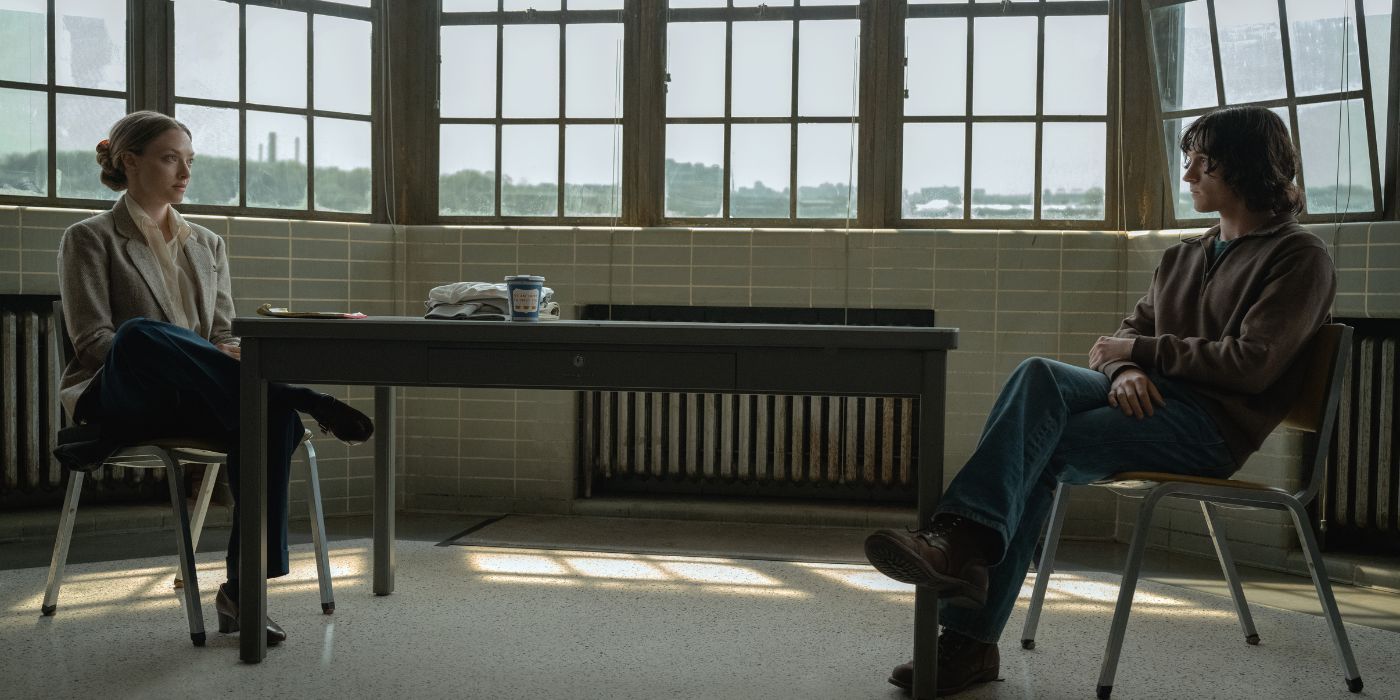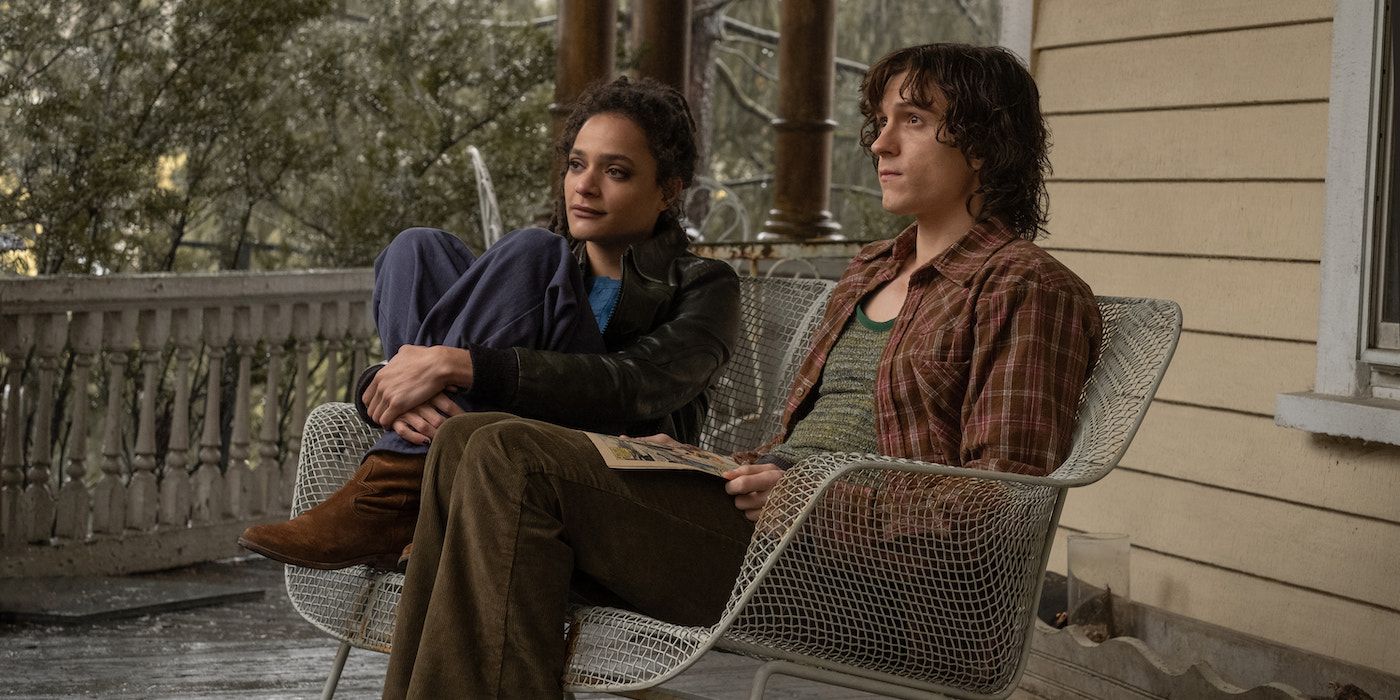There is something nice about seeing Tom Holland playing someone other than Spider-Man in the Apple TV+ series The Crowded Room. This isn’t because his take on the wall-crawler was bad, per se, but more that it felt like he was reaching a point where there was little that was challenging about it — for either him or the audience. Like many stars who get caught in the Marvel machine, there is a moment where you begin desperately hoping they make an exit before they’ve spent too much time trapped in its universe when they could have been trying out other parts. While some of Holland’s attempts to leave behind the web-slinging character have been overwrought, there have also been more promising works, like The Devil All the Time, where he showed he could tackle meatier parts. At first glance, it seems like this new series could similarly be one that gives him a lot more meat for him to sink his teeth into. Alas, the deeper you get drawn in, the more the story inexplicably holds you at a distance. Whether it is the manner in which it draws out its “mystery” to the point of frustration or how the subsequent fallout of its supposed surprise loses sight of Holland himself, The Crowded Room is aptly titled, more over-embellished than engaging.
This all begins with a shooting in 1970s New York City that the 10-episode series traces backward and forward from. Believed to be behind it is the troubled Danny Sullivan (Holland) who seems to be uncertain about what exactly happened. The only other person who can help him out is the elusive Ariana, played by a typically strong Sasha Lane of the spectacular recent film How to Blow Up a Pipeline, who seems to have fled from the scene and left Danny to take the fall. Enter interrogator Rya Goodwin, played by Amanda Seyfried in her first television role since her stellar work in The Dropout, who is trying to get to the bottom of what really happened and seems to care more than the police who just want to close the case. As she begins to question Danny about his involvement, the series takes us back through his painful childhood where home and school each brought with them their own traumas. Seeking safety from both, we learn that he fell in with the aforementioned Ariana and the largely absent Yitzak (Lior Raz) who happened to be moving in up the street from him. This stroke of luck is one of many the series begins to call attention to over and over, establishing that little in Danny’s life is what it seems. Or at least, that’s what it is going for.
‘The Crowded Room’s “Mystery” Never Feels Genuinely Mysterious
There is an odd tension at the heart of the series when what is going on with Danny becomes abundantly clear early on, but the story seems to believe it is actually rather complicated. While this review will not tip off what is happening to him, repeated interjections by Rya in the interrogation flag details with such obviousness that the show starts to become almost laughable in its attempt at intrigue. The credits inform us that this adaptation is inspired by the non-fiction novel from the acclaimed late author Daniel Keyes, whose very title could give away the game, but it makes a litany of changes that never really connect. Some of these are superficial, mainly names and places, while others are hugely significant in terms of tone as well as theme. The most significant is the real person Keyes wrote about who committed more serious crimes, whereas Danny is meant to be a tragic figure at war with himself.
Holland does his part in bringing this to life, capturing Danny’s shifting emotions and fears while never overplaying his hand. Where it starts to run into problems is in how characters, both Holland’s and Lane’s in particular, are siloed off from the rest of the story when it needs to lay out some details elsewhere. This is all part of how the series initially gestures at being a psychological thriller based on both the initial incident and a possible conspiracy that may be connected to it. However, the various misdirects are built on paper-thin attempts at subterfuge, which themselves are undone by the way the story keeps calling attention to its contradictions. Rather than let us gradually piece together what doesn’t seem to add up in Danny’s story and life up until he found himself sitting across from Rya, it keeps beating us over the head with repeatedly forced lines of dialogue. Most of these end up falling to Seyfried, who does all she can to make them sound natural but is hindered by blunt writing.
This could be forgivable if The Crowded Room didn’t dance around its deceptions for so long. Instead, there are simply far too many episodes that drop hints with all the subtlety of being shouted at through a bullhorn. When you’re five steps ahead of where the characters are, and the series continually attempts to pretend that we might not know where all this is going, any investment in what is happening becomes frayed. Some of this is explained with a flashback episode that also doubles as backstory for Rya as she takes on a more central role, but it still comes at the point where patience on the story playing catch-up to viewer knowledge has worn thin.
The show that kept bouncing around while watching this one was Sam Esmail’s masterful Mr. Robot, which pulled off the balance between thriller and measured character study with far more care. No matter how much the cast tries to offer some emotional depth here, it can frequently feel like they’re getting lost in the shuffle. Even when the truth is revealed, we don’t fully experience the impact this has on Danny as the show instead shifts into being about the legal proceedings, rendering him more of a passive observer. Some of this is captured in the way his life is now in the hands of his lawyer, played by an underutilized Christopher Abbott of the outstanding recent film Sanctuary, though much of it feels cold.
‘The Crowded Room’ Addresses Abuse to Mixed Results
Buried underneath all of this, there is a growing emphasis on abuse and the way it has a hold on the future of the characters. Without going into too much detail, some of this can come across as restrained and compassionate in how it plays out. It isn’t about trauma just for the sake of it and the scenes where characters speak openly about the pain of their lives feel honest. Even the depiction of the most devastating of moments is done with a restraint that both feels like a small kindness to the characters and an authentic depiction of how we block out certain parts of our pasts in order to survive. Unfortunately, other moments can feel like it is getting swept back into being more of a thriller where the “twists” undercut the emotional impacts of what is happening. Even with the cast to ground it, there are too many moments where the story starts to unravel and gets tangled up in superficial spectacle.
When everything takes a moment to slow down and just listen to the characters in moments of emotional transformation, there is a glimpse of what a more focused version of this story could have been. Instead, the emphasis on lackluster mystery subsumes what could have been a meditation on these more heavy subjects is its greatest tragedy. In the end, The Crowded Room was true to its name, never giving enough space to really let its characters breathe.
Rating: C-
The first three episodes of The Crowded Room premiere June 9 on Apple TV+ with the remaining seven episodes releasing weekly.
Stay connected with us on social media platform for instant update click here to join our Twitter, & Facebook
We are now on Telegram. Click here to join our channel (@TechiUpdate) and stay updated with the latest Technology headlines.
For all the latest TV News Click Here


